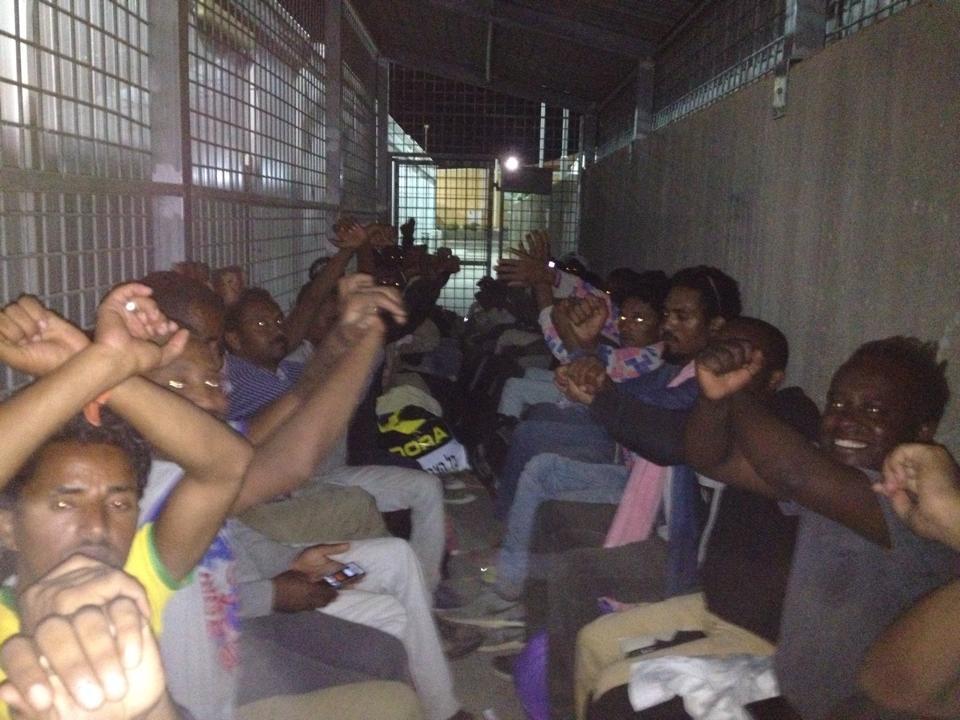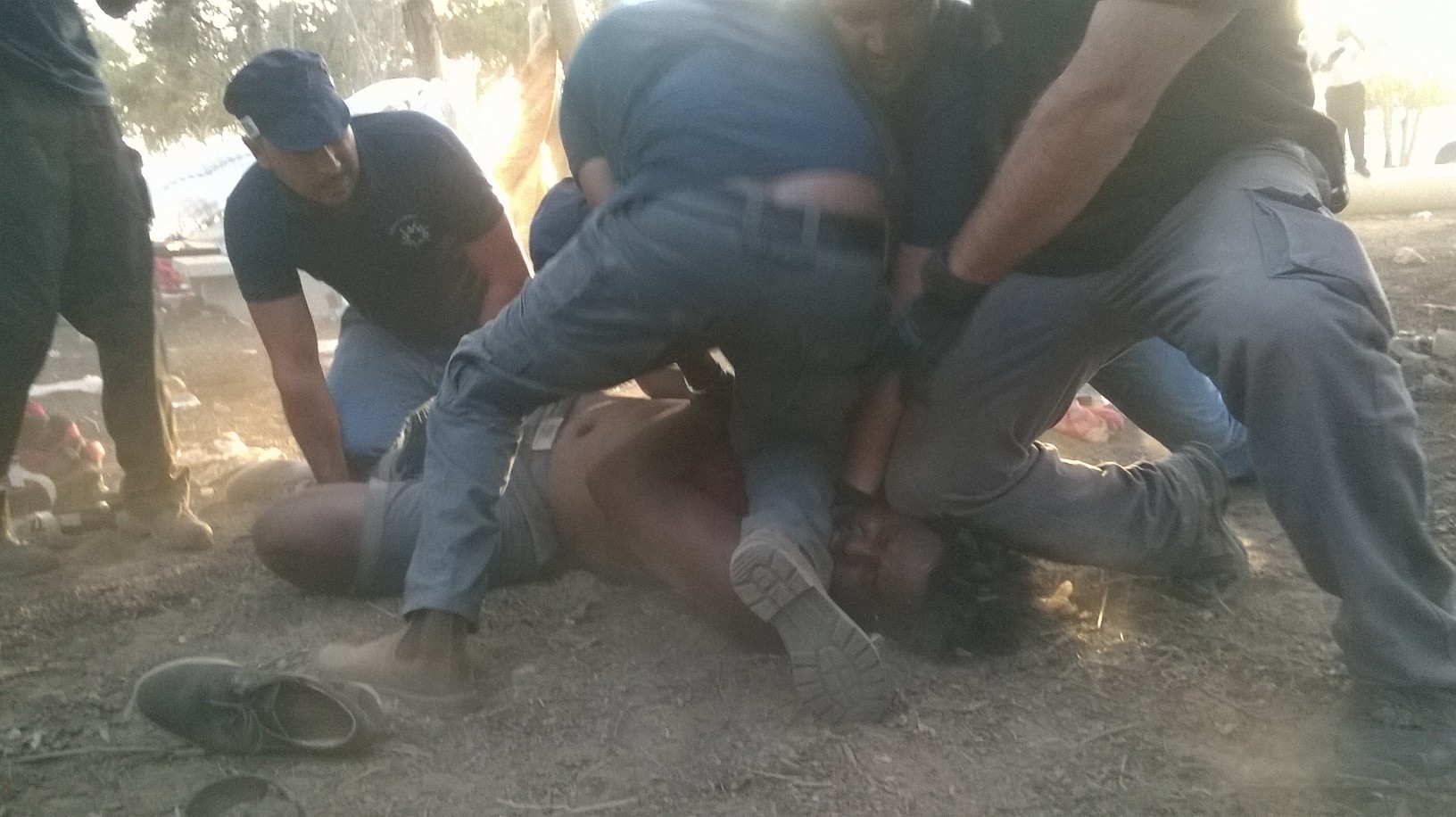“Freedom March” to Egyptian Border Violently Repressed
Yesterday evening (June 29), a large number of Immigration inspectors, Riot Police and special forces of the Yoav Unit raided a temporary protest encampment located near the Nitzana border crossing where about 750 asylum-seekers who have to be detained in Holot were staying. Within about 90 minutes, using excessive force, the police forces managed to load onto buses all the refugees. The buses took the refugees to Saharonim prison where the asylum-seekers were sentenced in a speedy proceeding by a Ministry of Interior clerk who is not a jurist, most of them to three months in prison and some of them to six. Once they complete the sentence, the asylum-seekers will be transferred back to the Holot open-air detention facility.
The asylum-seekers never exercised violence – some of them held onto trees, others sat on the ground, while others waked to the buses accompanied by policemen. Despite this, the policemen and inspectors resorted to violence which resulted in injuries of dozens of the asylum-seekers. Three of them were evacuated to Soroka hospital for medical treatment. Y., an Eritrean asylum-seeker who protested and was taken to Saharonim said: “It’s all the same: Saharonim is a prison, Holot is a prison. What can we do? This is the life we were given. Only God will help us.”
After a week of peaceful protests and a strike inside the Holot detention center, about 750 of the 2,370 asylum-seekers indefinitely detained in the facility without trial, launched on Friday (June 27) a march toward the Egyptian border. The statement of the marchers declared that they are have had enough with the detention in Holot and that they plan on reaching the border and ask the international community to help them. About 300 meters from the Nitzana border crossing, Israeli soldiers used force to prevent the asylum-seekers from marching forward and declared the area near the border a closed military zone. The asylum-seekers retreated to an eucalyptus grove located about a kilometer from the border crossing and have refused to return to detention in Holot.
This march toward Egypt, a country that flagrantly violates the Refugee Convention and deports asylum-seekers to torture and death in Eritrea and Sudan, is an indication of the desperation of the detainees in Holot. The only way asylum-seekers can be released from Holot into Israel is being recognized as a refugee, but due to Israel’s unfair asylum system, only a few of them will be recognized as refugees, even though the vast majority of Eritrean and Sudanese asylum-seekers are granted refugee status around the world. In addition, the Anti-Infiltration Law under which the asylum-seekers are detained does not force the State to respond to the asylum request of a detainee within a certain time frame. As a result, there are detainees in Holot who’ve been waiting for almost two years to a response to their asylum claim while in detention.
The asylum-seekers in Holot launched this Freedom March after ten days of holding a strike and peaceful protests inside Holot. On June 16, 2,100 asylum-seekers detained in Holot stopped taking part in the three daily roll-calls that are held in Holot in the morning, noon and evening that are intended to prevent the asylum-seekers from venturing too far from the desert facility. In addition, the asylum-seekers stopped working in the facility (for an hourly wage of NIS 12, $3.5). After four days of strike, the asylum-seekers began peacefully protesting inside the facility. The strike and protests were aimed against the detention conditions in Holot, especially the lack of proper medical treatment, and the policy of indefinitely detaining them without charge. In response, the Ministry of Interior arrested about 70 asylum-seekers, the leaders of the protest movment, and jailed them in Saharonim prison, across the road from Holot. Most of the asylum-seekers were sentenced to 30 days in Saharonim.
This is not the first protest of the refugees detained under the Anti-Infiltration Law. During the period when the 3rd amendment to the law was enforced, under which asylum-seekers had to be detained in Saharonim prison for a minimum period of three years, asylum-seekers organized several hunger strikes and in response were subjected to violence and slurs by prison guards. To break the strikes, the leaders of those hunger strikes were oftentimes transferred to criminal prisons and jailed alongside criminal prisoners, thus contravening Israeli law.

Photo taken on June 29 in Saharonim prison by one of the protesters shows his fellow inmates who remain defiant despite the violence meted out against them. The phones of the detainees were confiscated after their sentencing.
When the 3rd amendment was voided by the Israeli High Court of Justice in September 2013, the prison guards and Ministry of Interior officials in Saharonim informed the detainees that they are about to be released. When the Israeli government passed the 4th amendment to bypass the Court ruling, the asylum-seekers were instead transferred to Holot. About 150 of them launched a hunger strike to protest their renewed detention and afterward marched to Jerusalem in what became known as the Freedom March. This protest was violently repressed and the detainees were punished with three months impirosnment in Saharonim, during which the protesters launched another hunger strike that lasted almost three weeks. After the violent dispersal of the protest in front of the Knesset, asylum-seekers who remained in Holot launched another Freedom March. This March was repressed with extreme violence, long before the asylum-seekers missed a roll call. The last protest of the detainees in Holot happened about a month and a half ago due to lack of bed for new detainees from Israel’s cities who reported for detention in Holot.
Read here our new report about the detention conditions in the Holot desert detention center


